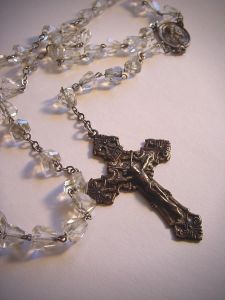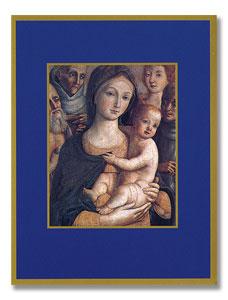| Author | |
momwise
Forum All-Star


Joined: March 28 2005
Location: Colorado
Online Status: Offline
Posts: 1914
|
| Posted: March 11 2010 at 1:37pm | IP Logged
|
 |
|
Ah, a stroke of Providence...I found that I had bookmarked the article AND I was able to find the bookmark 
Evangelizing with the Calendar by Joanna Bogle. It was in This Rock several years ago and I refer to a hard copy I keep around.
How, then, can we use the calendar to evangelize? We need to understand that the Church’s liturgical year is meant to be used this way. It developed over the years because we are human and need to be reminded of the truths of our faith in ways that we can understand. The Bible speaks of the importance of time and seasons: "To every thing there is a season, and a time to every purpose under heaven: A time to be born, and a time to die, a time to plant, and a time to reap . . . a time to weep, and a time to laugh." Our ancestors used not only books, stained glass, music, and pictures, but also the seasons of the year to commemorate the drama of Christ’s Incarnation, death, and Resurrection. This is our salvation story. It is at the very core of all our lives.
And from a more recent article, The Liturgical Calendar as Resource this observation:
But today, Catholics are poised to discover afresh a heritage that has much to offer. There is an awareness of feasts and seasons that is detectable and deserves recognition. What is needed is our active involvement: talks, booklets, information, the sharing of knowledge, seizing of opportunities. The field is open!
__________________
Gwen...wife for 30 years, mom of 7, grandma of 3.....
"If you want equal justice for all and true freedom and lasting peace, then America, defend life." JPII
|
| Back to Top |


|
| |
momwise
Forum All-Star


Joined: March 28 2005
Location: Colorado
Online Status: Offline
Posts: 1914
|
| Posted: March 11 2010 at 1:46pm | IP Logged
|
 |
|
JennGM wrote:
I was going to continue to flesh out some of the outline if people would still like that. But holler if you think not. |
|
|
Oh please do. We are so blessed to have your knowledge and thoughts.
I could also go on further about the family styles, which has been a new path for me ever since reading the Temperament God Gave You and realizing there is a unique "temperament" for each family, due to the various mixes of people in each one. But I think that might even be a good topic for a new thread. I will work on that 
__________________
Gwen...wife for 30 years, mom of 7, grandma of 3.....
"If you want equal justice for all and true freedom and lasting peace, then America, defend life." JPII
|
| Back to Top |


|
| |
JennGM
Forum Moderator


Joined: Feb 07 2005
Location: Virginia
Online Status: Offline
Posts: 17702
|
| Posted: March 11 2010 at 3:32pm | IP Logged
|
 |
|
momwise wrote:
Ah, a stroke of Providence...I found that I had bookmarked the article AND I was able to find the bookmark 
Evangelizing with the Calendar by Joanna Bogle. It was in This Rock several years ago and I refer to a hard copy I keep around.
How, then, can we use the calendar to evangelize? We need to understand that the Church’s liturgical year is meant to be used this way. It developed over the years because we are human and need to be reminded of the truths of our faith in ways that we can understand. The Bible speaks of the importance of time and seasons: "To every thing there is a season, and a time to every purpose under heaven: A time to be born, and a time to die, a time to plant, and a time to reap . . . a time to weep, and a time to laugh." Our ancestors used not only books, stained glass, music, and pictures, but also the seasons of the year to commemorate the drama of Christ’s Incarnation, death, and Resurrection. This is our salvation story. It is at the very core of all our lives. |
|
|
Oh, this is fabulous, Gwen! I'm so glad you were able to find them! I loved them both. There were a few things that jumped out at me, echoing what I have been saying for years! I think the following quote is the point I think Eleanor was approaching at the beginning of the thread. Someone says "I want to live the Liturgical Year but don't know where to begin" can be overwhelmed. Her approach is very sound:
Joanna Bogle wrote:
In using the Church’s calendar as an evangelization tool, we first should teach its basic structure. This commemorates the birth, death, and Resurrection of Christ, his Ascension into heaven, and the coming of the Holy Spirit. We should explain why and how these great events came to be associated with particular times of the year. We should stick with the basic biblically-based calendar first—starting with Christmas. It seems obvious, but we do need to recall that long ago people in Europe marked the central part of winter with a festival, held on the shortest day of the year. With the coming of Christian missionaries, it was only natural that this festival should be seized as an opportunity to celebrate the birth of Christ. (In our own century, this feast is rapidly becoming once again a midwinter pagan festivity. Which would Evangelical Christians rather have?) As we move on to examine Easter, we need to understand its link with the Jewish Passover. We also need to know why and how the Church fixes the date of Easter each year and how richly biblical is the whole concept of Lent (forty days to mark Christ’s time fasting in the desert and echoing too, of course, the Israelites’ forty years there).
Only when we have fully explored this—and there is much more than there is room to discuss in one article—should we then explain about saints’ days. A saint’s feast day is simply the day he or she died and went to heaven. The feast day will often have some custom associated with that saint’s life and work, or manner of death. We do not have to pretend that the Church honors and sanctifies every element of festivity associated with every saint, but many are useful and timely reminders of basic Christian truths. |
|
|
Momwise wrote:
And from a more recent article, The Liturgical Calendar as Resource this observation:
But today, Catholics are poised to discover afresh a heritage that has much to offer. There is an awareness of feasts and seasons that is detectable and deserves recognition. What is needed is our active involvement: talks, booklets, information, the sharing of knowledge, seizing of opportunities. The field is open! |
|
|
Oh, and I loved this quote:
Joanna Bogle wrote:
| Please do not let anyone tell you -- I’m afraid some over-enthusiastic devotees of the only-the-Tridentine-Mass-is-acceptable faction have a tendency to do this -- that “in the old days, the Church’s calendar was wonderful, but now it’s all been spoiled”. This is simply not true. I set about discovering the Catholic calendar as a post-Vatican II adult, and it has been a source of endless interest and fascination -- the subject of a book (now in its fifth edition), a radio series, and talks and lectures to groups of every kind. |
|
|
__________________
Jennifer G. Miller
Wife to  & ds1 & ds1  '03 & ds2 '03 & ds2  '07 '07
Family in Feast and Feria
|
| Back to Top |



|
| |
JennGM
Forum Moderator


Joined: Feb 07 2005
Location: Virginia
Online Status: Offline
Posts: 17702
|
| Posted: March 13 2010 at 9:56pm | IP Logged
|
 |
|
[quote]4) What is worship? What does it mean to “celebrate” in Church’s terms in the Liturgy?
I can't believe I just recently discovered that the Compendium to the Catechism was online. I thought it was only available in book form, and just finally got a copy. Then to discover it's actually all out there online for free from the Vatican. Anyway, it's such a treasure! It's so helpful in the summaries of the Catechism.
I thought I'd share some quotes in answering these questions. The outline I gave my above was my pondering, so I'm finding these answers helpful to me, too.
From the Catechism's Glossary: wrote:
Worship: Adoration and honor given to God, which is the first act of the virtue of religion (2096). Public worship is given to God in the Church by the celebration of the Paschal Mystery of Christ in the liturgy (1067). |
|
|
CCC 1067 wrote:
| “He accomplished this work principally by the Paschal mystery of his blessed Passion, Resurrection from the dead, and glorious Ascension, whereby ‘dying he destroyed our death, rising he restored our life.’ For it was from the side of Christ as he slept the sleep of death upon the cross that there came forth ‘the wondrous sacrament of the whole Church.’” For this reason, the Church celebrates in the liturgy above all the Paschal mystery by which Christ accomplished the work of our salvation. |
|
|
Compendium wrote:
218. What is the liturgy?
1066-1070
The liturgy is the celebration of the mystery of Christ and in particular his paschal mystery. Through the exercise of the priestly office of Jesus Christ the liturgy manifests in signs and brings about the sanctification of humankind.
The public worship which is due to God is offered by the Mystical Body of Christ, that is, by its head and by its members.
219. What place does the liturgy occupy in the life of the Church?
1071-1075
The liturgy as the sacred action par excellence is the summit toward which the activity of the Church is directed and it is likewise the font from which all her power flows. Through the liturgy Christ continues the work of our redemption in, with and through his Church. |
|
|
In thinking of the Liturgy celebration, the one thing I wanted to look up is the word "celebrate". I haven't found a good definition in "liturgical" terms.
I love how there is a hierarchy of feasts in the Church's liturgical year. There are visible signs of the ranking of the feast day: the vestment colors (white, the high feasts), the additional prayers (Gloria, Creed), additional readings, flowers and decorations, the high Mass with the sacred music, added vespers and vigils extending the feast day into more than 24 hours, no fasting or abstaining for solemnities, etc. These are some of the ways the Church "celebrates" feasts.
__________________
Jennifer G. Miller
Wife to  & ds1 & ds1  '03 & ds2 '03 & ds2  '07 '07
Family in Feast and Feria
|
| Back to Top |



|
| |
Helen
Forum All-Star


Joined: Dec 03 2005
Online Status: Offline
Posts: 2826
|
| Posted: March 15 2010 at 12:40pm | IP Logged
|
 |
|
Over the years, I've tried to have practices during the week for me and my children which point to Sunday Mass. This year I tried to organize them more so that I accomplished one thing a day which turned my mind to Sunday's Mass. I wish I could say I had been more faithful to these ideas. For next year, I think I'll try to organize them more in advance -- this might help me to keep a strong tack on this.
Anyway, here's my list
Mondays -- begin school day with the next Sunday's Psalm. Review the psalm response during the week at lunch. blog post on psalms
Tuesdays -- prepare Sunday clothes. Make sure boys's shirts are ironed, Sunday socks are washed and cleaned. Look at girls dresses. blog post on ironing and Sunday Mass -- see last paragraph
Wednesdays -- Review St. Paul's letter read at Sunday's mass. Pick out a word for the children to focus on and listen for at Mass. During the year of St. Paul, most weeks I put this word on our fireplace mantle. you'll have to scroll down this category
Thursdays -- instead of reading the daily gospel, which we used to read at Tea Time but now we read first thing in the morning, read Sunday's gospel. Highlight that Thursday is a remembrance of the First Holy Thursday, the day in which the Eucharist was instituted.
Friday -- abstinence prepares our hearts to receive the food of heaven. Our hunger from abstaining from meat reminds us to be hungry for the Bread of Heaven. thorough blog post on Friday abstinence
Saturday -- something for Our Lady who always kept the Lord (and the Eucharistic Lord) in her heart.
__________________
Ave Maria!
Mom to 5 girls and 3 boys
Mary Vitamin & Castle of the Immaculate
|
| Back to Top |



|
| |
JennGM
Forum Moderator


Joined: Feb 07 2005
Location: Virginia
Online Status: Offline
Posts: 17702
|
| Posted: March 15 2010 at 12:48pm | IP Logged
|
 |
|
I love your list. I do remember you posting about Tuesdays. That's too early for me...I think my laundry from the weekend is still being processed. But when I'm ironing at the last minute I always think "Helen's right, I need to be doing this earlier." 
So, I need to nail down a day. Usually it's the night before, but perhaps a little earlier than that.
__________________
Jennifer G. Miller
Wife to  & ds1 & ds1  '03 & ds2 '03 & ds2  '07 '07
Family in Feast and Feria
|
| Back to Top |



|
| |
Eleanor
Forum Pro


Joined: June 20 2007
Location: N/A
Online Status: Offline
Posts: 326
|
| Posted: March 15 2010 at 11:07pm | IP Logged
|
 |
|
Thank you for sharing your list, Helen. And those links -- so many lovely things to consider! 
|
| Back to Top |


|
| |
LeeAnn
Forum Pro


Joined: May 25 2007
Location: Washington
Online Status: Offline
Posts: 470
|
| Posted: April 19 2010 at 11:46am | IP Logged
|
 |
|
LeeAnn wrote:
Eleanor wrote:
| Jenn (or anyone else), are you familiar with the Children's Daily Prayer book that's offered by LTP? It's designed for Catholic schools, and has daily prayers that are said to be based on the lectionary readings. The author (Margaret Brennan) is a CGS catechist. Thing is, I haven't been able to find a sample of the actual contents. |
|
|
I have copies of this at the church and the "Children's Daily Prayer for Summer" on hand here at home. The summer book is organized like this for each day: Introduction, Psalm, Reading, Reflection, Closing Prayer.
The introduction is sort of a "this day in history" feature. Sometimes these are about the saint of the day but about half the time they are not. There are a few troubling inclusions, most prominently Mohammed (June 7). It's the kind of thing you would find in a secular textbook. Overall though when it mentions saints and Catholic laypersons it gets the information right. You could substitute Foley's "Saint of the Day" for when the information given is inappropriate.
...
The school year book is similar although it is larger of course. |
|
|
Getting back to this a month later!! I just wanted to let you know, now that I have the regular edition of Children's Daily Prayer for 2009-2010 in front of me, that it does NOT have any secular figures or non-Catholic figures included in the daily readings.
It is apparently only the SUMMER book of Children's Daily Prayer that includes short biographies of non-Catholic and secular persons as part of the day's readings. I hope that makes others feel at ease to use this resource.
Each day's entry has an opening, a psalm, the day's Gospel, a question for silent reflection (today, 4/19 is "How do we know that the Holy Spirit was with St. Stephen?") and a closing prayer.
At the bottom of the page there is a one sentence "Also on this day" factoid on about a quarter of the pages that mentions secular or major holidays of other religions (like MLK Jr day, Nat'l Teachers Day, Eid or the various Jewish festivals) that I presume most children learn about in school. For example, p. 265 for 4/11 has "Also on this day: Yom Hashoah (National Holocaust Memorial Day)."
__________________
my four children are 17, 15, 11 & 8 - all now attend public school - we read many 4Real recommended books at home
|
| Back to Top |



|
| |
SuzanneG
Forum Moderator


Joined: June 17 2006
Location: Idaho
Online Status: Offline
Posts: 5465
|
| Posted: June 20 2013 at 11:07am | IP Logged
|
 |
|
Bump! This is a great thread from 2010 full of things to contemplate for our families.
__________________
Suzanne in ID
Wife to Pete
Mom of 7 (Girls - 14, 12, 11, 9, 7 and Boys - 4, 1)
|
| Back to Top |


|
| |
JennGM
Forum Moderator


Joined: Feb 07 2005
Location: Virginia
Online Status: Offline
Posts: 17702
|
| Posted: June 21 2013 at 8:45am | IP Logged
|
 |
|
I enjoyed this thread, although I did monopolize the conversation. I can't believe it was 3 years ago. I've been doing a lot of reading and thinking and praying about this area lately. I'm busting to talk or write about it!
__________________
Jennifer G. Miller
Wife to  & ds1 & ds1  '03 & ds2 '03 & ds2  '07 '07
Family in Feast and Feria
|
| Back to Top |



|
| |
mylonite
Forum Pro


Joined: June 01 2010
Location: Montana
Online Status: Offline
Posts: 110
|
| Posted: June 21 2013 at 10:21am | IP Logged
|
 |
|
Jennifer, please do write about it! As someone who grew up not Catholic, I find this fascinating.
__________________
~ Kim
Mama to DD1 (6), DS (5), DD2 (2), DD3 (1), DS2 (08/16)
Mama also to four in Heaven
|
| Back to Top |



|
| |
stefoodie
Forum Moderator


Joined: Feb 17 2005
Location: Ohio
Online Status: Offline
Posts: 8457
|
| Posted: June 21 2013 at 1:39pm | IP Logged
|
 |
|
I'm soooooo glad you bumped this thread, SuzanneG!! I've been telling myself to go look for it and just haven't gotten around to it. I've now added it to my favorites, which is what I should have done in 2010!!  
__________________
stef
mom to five
|
| Back to Top |



|
| |
momwise
Forum All-Star


Joined: March 28 2005
Location: Colorado
Online Status: Offline
Posts: 1914
|
| Posted: June 22 2013 at 10:33am | IP Logged
|
 |
|
Ditto! Thanks Suzanne....I am re-reading everything. Jenn spoke at the Rocky Mtn. Conference last summer and it was wonderful. I sent the link out to our local group too! Hope you're having a blessed Summer 
__________________
Gwen...wife for 30 years, mom of 7, grandma of 3.....
"If you want equal justice for all and true freedom and lasting peace, then America, defend life." JPII
|
| Back to Top |


|
| |
JennGM
Forum Moderator


Joined: Feb 07 2005
Location: Virginia
Online Status: Offline
Posts: 17702
|
| Posted: July 01 2013 at 10:59am | IP Logged
|
 |
|
I have been doing some varied reading from periodicals and books that either highlight the Liturgical Movement or were written during that time period (from Pius X to Vatican II).
I came across this article from Dom Virgil Michel from the periodical Orate Fratres, Vol. 11, 1936.
His writing is a little deep and takes some concentration, but he summarizes how the liturgy should be the center of our lives.
I posted the article here: Back to the Liturgy. (I keep thinking the title reminds me of the "Back to the Land" call, which was part and parcel of much of the Lit Movement.) I'm quoting a few highlights:
Virgil Michel, Back to the Liturgy wrote:
The Christian life is in every way a unified life, and the “true Christian spirit” is in every way an all-embracing and unifying spirit. They are such within the life of the individual member of Christ as well as within the life of the entire fellowship of Christians constituting the mystical body of Christ. In the individual, the true Christian spirit must pervade all the aspects and contacts of his life. Else he is—no matter how great his personal sincerity or his good will may be—a kingdom divided against itself, for which we have the word of Christ that it cannot endure. In the Christian body as such there must likewise be an all-embracing whole-heartedness, and an intimate unity whose supreme bond is an efficacious charity. Where this condition does not obtain and individual members live in terms of their own personal aims as apart from those of the fellowship, i.e., of God in the fellowship, there the Christian body as such is also as a kingdom divided against itself, no matter what the good intentions of its members may be....
Once we learn to seek first the kingdom of God, once we learn to die unto ourselves by constantly giving ourselves over to that which is much greater than our own puny selves, we shall also learn the divine lesson that the kingdom of God is within our own hearts, and that the pursuit of God means the constant growth of this kingdom within our own hearts.
Here, again, we come face to face with the liturgical mystery, which is the making present of the work of Christ’s redemption, the kingdom of God, in our own very souls. Abundant participation in the liturgy means abundant pursuit and growth of the kingdom of God in our own hearts and in the entire unified fellowship of the mystical body of Christ....
==========
Once again we have come to the liturgy. The prayers of the liturgical mysteries are the best expressions of the mind of Christ that the ages of Christianity have formed and passed on to us. Active participation in them is an intelligent and voluntary steeping of our minds in the very mind of Christ. And so the liturgy is not only the source of divine life or grace, not only the divine inspiration to put forth generous effort towards the growth of the kingdom of God in souls, but also the divine school of the formation of our minds in the way of Christ. The more actively and intelligently we participate in the liturgical mysteries, the more truly will our efforts also be directed in God’s own way towards the flourishing of the true Christian spirit among men.
All of this is but a summary of the divine purpose with which the love of God has pursued man in spite of his infidelity. Truly the kingdom of God is at hand for everyone of us at all times. It remains only for us to understand and to act. Nor will any amount of effort on our part exhaust the possibilities before us. Our natures are finite, it is true, and what we attain through God is the divine and the infinite, which our natures can never possess in its entirety. But by that same token, also, there is never a time coming for us when we may say: now we have attained all there is to attain. There is never a time when we may not attain yet more of the divine life that exists in infinite abundance. And so the pursuit of love, which is on our part a sharing in the divine love of God, can go on with ever greater efficacy and success.
That, in fact, is the glory of the goodness God has shown to us and has put within our reach in the divine enactment of the liturgical mystery. What woe for us, that we have been heirs to so great a neglect and loss of the true liturgical spirit! |
|
|
__________________
Jennifer G. Miller
Wife to  & ds1 & ds1  '03 & ds2 '03 & ds2  '07 '07
Family in Feast and Feria
|
| Back to Top |



|
| |
JennGM
Forum Moderator


Joined: Feb 07 2005
Location: Virginia
Online Status: Offline
Posts: 17702
|
| Posted: July 01 2013 at 11:06am | IP Logged
|
 |
|
There are two more articles (part 1 and part 2) that I want to scan on the Family and the Liturgy. But it continues application that the liturgy must be the center of our lives. Dom Michel then continues with practical examples of living it in the home, and then has this fabulous conclusion, which sums up so much of what has been said here:
Quote:
| Such a restoration of the liturgy to its proper place in the lives of the faithful should make a great difference only in their active participation in the services of the altar, but also in their daily life and atmosphere at home. A family that is thus truly imbued with the true Christian spirit through intelligent participation in the liturgical life of the Church will have no difficulty in producing and upholding a Christian atmosphere in the home itself. Such a Christian atmosphere will be a natural result, and there will be no effort needed for establishing the practice of Catholic reading and literature in the home, for a common expression of religious life by the member of the family, and the like. All of this will be the natural outcome of their consciousness of the family as a miniature mystical body that draws its true Christ-life out of the indispensable source of this same life in the liturgy of the Church. |
|
|
__________________
Jennifer G. Miller
Wife to  & ds1 & ds1  '03 & ds2 '03 & ds2  '07 '07
Family in Feast and Feria
|
| Back to Top |



|
| |
|
|


 Topic: Liturgy as the basis of our lives
Topic: Liturgy as the basis of our lives








 & ds1
& ds1  '03 & ds2
'03 & ds2  '07
'07










